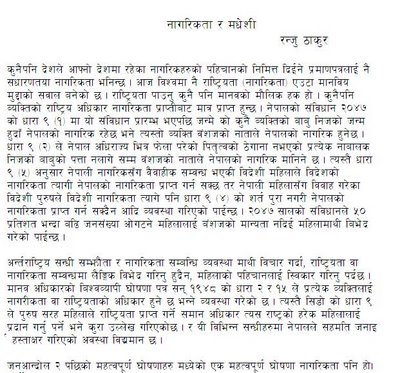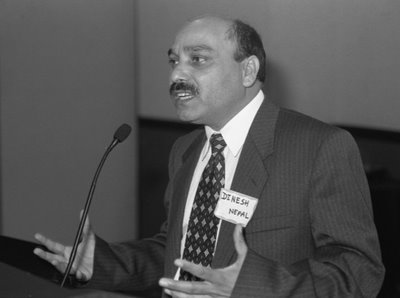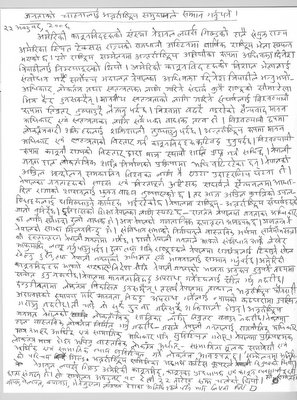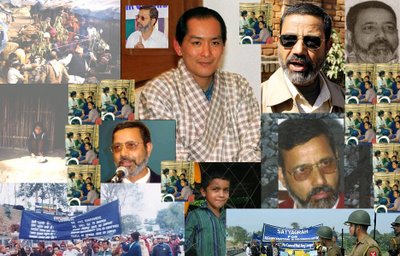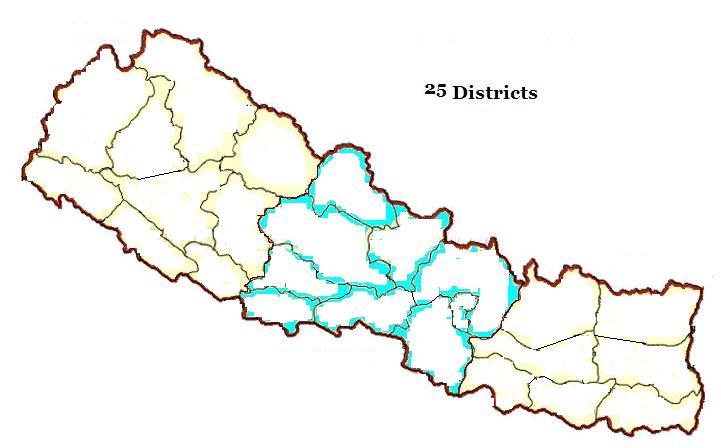
We have to draw a clear line in the sand. There are things that we simply can not compromise on. There can be no compromise whatsoever on human rights. There can be no compromise on multi-party democracy. There can be no compromise on free and fair elections to a constituent assembly. The Maoists may not participate in those elections as a parallel state but only as a political party.
The seven party alliance does have the military option if the Maoists were to act unreasonable. But that option is only viable after the alliance has exhausted all political options. How do you exhausts all political options?
You eat the Maoists' lunch. You come out for a republic stronger than the Maoists. You take the lead on security sector restructuring. You get proactive on the details of federalism. Start churning out proposed maps. The beauty of taking this political tack is that it makes the military option less and less necessary.
There are those who say we have to fear the royalist elements in the military. That is a wrong assumption. The king and the royalists tried everything they could in April. They were defeated by the people in an uprising that has no precedence in world history. Remember?
The seven party alliance does not have to fear the palace. But it does have to fear the people. The people are watching.
The seven party alliance does not have to fear the Maoists. It can afford to negotiate from a position of strength. Use of force for the cause of human rights and democracy is legitimate as long as that use of force is a weapon of last resort after all the political weapons have been put to use without success.
So I say, don't be scared of the Maoists. The Nepal Army is at your disposal. There is massive international backing. But don't think of the military option. Negotiate from a position of strength.
The country is in transition. There are two states in place. The Maoist state is authoritarian. That confusion has given rise to lawlessness to a large extent. This confusion can not be allowed to last for too long. Political clarity has to be offered.
It is fundamentally important that the two Congress factions make the idea of a federal republic the glue that brings them back together and binds them together. BP Koirala was a republican. When he was for a constitutional monarchy, it was only in response to the cold war realities. He dreamt of sending the crown to the museum.
The Nepali Congress should not go for a republic because of Maoist pressure but because ending monarchies has always been the democratic goal in world history. Monarchy and democracy are antonyms in the dictionary for a reason, like day and night, like dark and light, like hot and cold.
The authoritarian ways of the Maoists where they run a parallel state are offensive, and that will cost them big during the elections. And so the seven party alliance has to get proactive politically. Snatch the initiative away from the Maoists. Take over the lead.
Solve The Bhutani Refugee Crisis: Send Them West
Federalism: Four Layers Or Three Layers
Girija: A Ceremonial Monarch Wannabe
Maoist Transformation From Parallel State To Political Party: An Essential Precondition
Summit Talks And Obstinate Congressias
Summit Talks And Maoist Nonsense
Summit Talks: Four Heads Talking
Televise The Summit Talks
The Summit Talks Will Succeed
The Hardliner Democrat Approach (June 7, 2005)
The Bombing Of A Bus
Power Does Not Necessarily Flow Through The Barrel Of A Gun: Maoists
In The News
Maoists disrupt Congress program, abduct party cadres NepalNews Nepali Congress (NC) in Kalikot district. ..... the Maoist cadres flouted ceasefire code of conduct by disrupting their peaceful program. The party was holding "Gaun Milan Program" – a village party campaign – in Nelmudi VDC of the district on Saturday when the Maoists intervened. ..... the Maoist cadres not only disrupted their program but also severely thrashed dozens of district leaders and workers of the party. They tore apart NC's party flag, vandalized the podium and abducted some leaders. ...... in Budhanilkantha of Kathmandu, the Maoists abducted Prabin Khadka, a worker of NC (Democratic) party on Sunday. The party has condemned Khadka's abduction. Likewise, the Maoists abducted Congress workers Naresh Raut Kurmi, Jawahir Raut Kurmi and Krishna Nandan Yadav from Rautahat district on Monday.
Maoist claims on people's support is not factual, says Moriarty claims made by Maoists regarding the wide public support they enjoy are not factual. ..... Moriarty said that the Maoists "would get a very few votes if elections are held in the present context." ...... "Maoists will not submit their entire arms, they have a different grand design," Anand Sworup Verma ...... Moriarty also told his guests - which included India's Nepal expert Professor SD Muni - that the US believes that the Maoists should not be included in the government until their arms are managed ......
No surrender before CA, says Gurung his party will not surrender (its arms) before the Constituent Assembly elections. ..... claimed that if the Maoists were to lock up their arms right away, the Nepali Army (NA) would engineer a coup. ...... While the government feels that the Maoists must completely give up their weapons before anything else can go ahead, the Maoists say they cannot surrender their arms without settlement on full political package.
Martin seeks early resolution of arms issue Martin further said that the Nepali Army should stay in barracks while the Maoists’ People’s Liberation Army should remain in cantonments to ensure free and fair elections to a constituent assembly (CA). ......modalities are needed for a complete monitoring of arms management ..... “To express solidarity with the ongoing peace process, Norway is increasing its development aid to Nepal by around 40 per cent by next year” ...... KP Oli said the government was fully committed to establish a permanent peace by bringing the Maoists to competitive politics and urged the Maoists not to resort to arms in the run-up-to the CA polls
PM Koirala, UML general secretary discuss ongoing peace process NepalNews
Media situation has not improved as expected even after democracy: FNJ intimidation of journalists and attempts to curtail media freedom have not come to an end .... “Nature of attack has changed but journalists are still facing threats and attacks especially from Maoists, various anti-social groups and also political parties” ...... at least 32 cases of violations of media rights and intimidation of journalists by different sides including the army, police, Maoists and local administrations.
SC issues show-cause notice to govt on Bhairabnath ‘disappearances’
Pokhrel is new CEC
ABD to provide $100 m to expand Rural Finance rural poverty in Nepal has been declining, thanks mainly to large remittance inflow .... Funds from this first loan will be used to re-capitalise the Agricultural Development Bank Limited (ADBL), the third largest bank in the country.
Maoists say they are willing to take part in CA elections without joining interim government
they are even willing to take part in CA elections 'peacefully' without joining the interim government. ..... Prachanda said that since "fruitful dialogue was going on" he expects all issues to be resolved within a week. ..... on Sunday the Maoist chairman Prachanda had also made another offer - of stockpiling all his weapons but in a single lock up ........ the Maoists had been saying they were willing only to lock up fifty percent of their arms and demanded that Nepali Army also do the same. ...... On the issue of monarchy, there seems to be a broad understanding that the current powerless status of the King would be allowed to continue till the CA elections. The first meeting of the CA would then decide the fate of monarchy.
Russian experiences important for Nepal's economic development: Dr Mahato President of the Non-Resident Nepalese Association (NRNA) Dr Upendra Mahato ..... a two-day national conference of the NRNs in the Russian capital of Moscow .... Speaker Subash Nemwang said the bill on NRN is under debate in the parliament and expressed hope to get it endorsed soon incorporating suggestions given by the NRNs. ....... Central committee member of the UML Raghubir Mahaseth urged the NRNs to take initiative to use their earnings and skills achieved in foreign countries for development of Nepal. ....... Vice President of Nepal-Russia Chamber of Commerce and Industry Jiwa Lamichhane said contribution of the remittance sent by the NRNs has helped to sustain Nepalese economy even in critical period of insurgency. According to him, around Rs 130 billion enter Nepal every year as remittance. ...... Spokesperson of the NRN International Coordination Committee Dr Jugal Bhurtel
Moriarty to discuss Nepal issue in New Delhi
Rethinking of Maoist Demand of Constituent Assembly Election
Emerging Trends Ambassadors of more than 10 countries were recalled within hours after the government was formed but these six months have passed without ambassadorial assignments in even the top priority countries. ...... Tribhuwan University , the oldest university of the country, which has more than 200,000 students, has no vice chancellor. ...... “If our political demands are not addressed, we don’t hesitate to back to war as we did in the past when more than 12,000 people were killed,” CPN-Maoist leader reportedly told in Baluwatar summit. “We want final negotiations and time is running out.” ........ The permanent judges of Supreme Court and lowers courts are all the time being threatened by politicians in power stressing that the judges would have to get reappointment as soon as interim constitution is enacted. ....... The government is also in a hurry to invite foreign investors in hydropower sector. ...... Some Nepalese experts who are either retired or still in job argue all the time explaining that projects like Upper Karnali has minimum cost and maximum rate of return which can be completed through the use of Nepalese skills and resources. ...... Then came the most sensitive issue of citizenship in the country. The constitution of Nepal 1963 for the fist time determined the cut off date for domicile persons of foreign origin. The 1990 constitution maintained the same cut off date by consensus. Now the government did not wait either for Constituent Assembly or interim constitution but all ministers in seven parties in the government passed unanimously the draft of citizenship bill which is contrary to the article 9 and 10 of the constitution. ...... Some vocal political leaders of regional parties like Nepal Sadbhavana Party have aroused a sentimental feeling of separation from the hills, if this proposed cut off date of 1990 is rejected. They have said Nepal will face scenario like that of war-torn Sri Lanka . If it is implemented in toto, the country may face the fate of Sikkim ...... “If the parties do not support the bill, we don’t have any option other than to launch the war against state as in Sri Lanka ,” Minister of Industry, Commerce and Supply Hridayesh Tripathi. ....... the government with short nature has already accepted the proposal of high level media committee to allow 49 percent of share to foreign media company. Even neighboring India has permitted only 25 percent of foreign investment in media sector.
Army sacks captain; slaps one year jail sentence
Prachanda invited to HT's Leadership Summit by The Hindustan Times daily in New Delhi ..... The Summit to be held in November 17-18 will be participated by a panel of reputed speakers from around the world including Indian Prime Minister Dr. Manmohan Singh, Congress president Sonia Gandhi, Afghan president Hamid Karzai, former British foreign secretary Jack Straw, former Malaysian president Mahathir Mohammad, former New York mayor Rudolf Guilliani, communist leader Sitaram Yechury, BJP leader Arun Jaitly, business magnate Vijay Mallya, cricketer Saurav Ganguly and film producer Karan Johar, among others. ...... Prachanda will be one of the panel speakers in the summit. ..... The topic of the summit is "India: The Next Global Superpower?" According to the advertisement, the partner organizers of the summit include Tata, Aditya Birla Group, Microsoft, ONGC etc.
Three rhinos killed in two weeks
